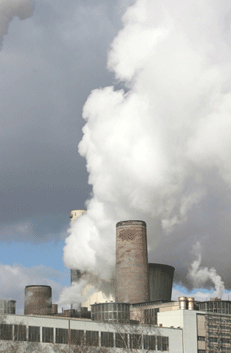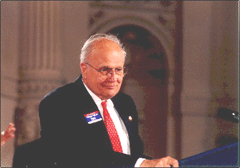Re-energized on the Hill
Air Date: Week of December 7, 2007

If it becomes law, the energy bill would limit emissions from dirty power plants similar to this one. (Photo: Lawrence Berkeley National Laboratory)
The House approves an energy bill with historic increases in fuel economy standards for cars and trucks. But a provision to increase wind solar and other renewable sources of electricity still faces stiff opposition. Living on Earth's Jeff Young has the latest.
Transcript
GELLERMAN: From the Jennifer and Ted Stanley Studios in Somerville, Massachusetts, it’s Living on Earth. I’m Bruce Gellerman, in for Steve Curwood.
The U.S. Congress has taken two big steps that could dramatically change the country's approach to clean energy and climate change. In the Senate, a cap on greenhouse gas emissions won an important preliminary vote. And in the House, lawmakers approved an historic energy bill that would make our supply of electricity a lot cleaner and our cars and trucks a lot more fuel-efficient. House Speaker Nancy Pelosi says Congress was highly motivated to pass the energy bill.
PELOSI: The price at the pump is a very compelling reason. It’s as personal to the American people as that, and as global as preserving the planet, and everything in between. It will be a shot heard around the world, for energy independence for our country.

California Democrat Nancy Pelosi, the speaker of the House of Representatives. (Courtesy of Office of the Speaker)
YOUNG: Hey, Bruce.
GELLERMAN: Let’s start with the Senate global warming bill. You’ve been covering this a lot lately.
YOUNG: Well, it’s a pretty big deal. It would be the first mandatory cap on carbon emissions in the U.S. It got out of the environment committee, and it got out of there with no big changes that would weaken it. So this is a bill that would cap those emissions, set up a trading system where companies could buy or sell credits for their CO2 emissions.
GELLERMAN: This was Republican Senator John Warner’s bill, right?
YOUNG: Right. It’s a bipartisan bill. But Senator Warner was the only Republican on the committee to vote for it. Other Republicans are very concerned about the effects this would have on energy prices and the economy. And that’s the issue that’s going to make this bill a real long shot to really make it into law.
In the meantime, however, supporters say just the committee vote alone sent a strong signal to the rest of the world. So, for example, the international leaders gathered right now in Bali to talk about global warming will know, ‘hey, there are people in the United States who are concerned about climate change and who are ready to act.’
GELLERMAN: Well, tell me about the House energy bill. This would what—increase the fuel economy standards. I was reading that the average miles per gallon that a U.S. auto gets is somewhere around 25 miles a gallon, which is actually lower than it was 20 years ago?
YOUNG: Yeah. It’s been three decades since Congress even touched this issue of fuel economy standards. This bill would boost it to 35 miles per gallon by the year 2020. Now there are a few loopholes in there, but this is a very major change. Some environmentalists I’ve talked to say this would be their biggest victory in 20 years—the biggest thing since the improvements to the Clean Air Act.
GELLERMAN: Hmm. Well, give us some context. What does going 35 miles per gallon do, in terms of the oil we use?
YOUNG: It really adds up. This would reduce oil consumption by about a million barrels a day. That’s about half what the U.S. now imports from the Persian Gulf. It would save consumers somewhere around $20 billion, in terms of what they actually pay at the pump. It would also cut CO2 emissions. I read one estimate that says this would be like getting 25 million cars off the road. So it’s a big deal.
GELLERMAN: Wow. I imagine taking cars off the road isn’t going to go over well in Detroit. And plus you have Motor City Congressman big John Dingell. He’s nixed basically every fuel-efficiency standard that’s come down the pike. What’s changed?

Congressman John Dingell (D-MI) (Courtesy of U.S. House of Representatives)
BECKER: His interest in the environment has always stopped at the car door. The speaker has had a long history of wanting to protect the environment. This became a battle of titans, where the formerly most powerful member of Congress, John Dingell, went up against the new most powerful member of Congress, Nancy Pelosi. And she cleaned his clock.
GELLERMAN: Mmm. Well, tell me about the other provisions in there. What’s this do for renewable energy for electricity?

If it becomes law, the energy bill would limit emissions from dirty power plants similar to this one. (Photo: Lawrence Berkeley National Laboratory)
YOUNG: Well this bill says to utilities: ‘you’ve got to get 15 percent of your power, either through clean sources like wind, solar, geothermal, or biomass, or by improving efficiency in your system.’
GELLERMAN: But I thought a lot of states already had been doing this.
YOUNG: Twenty states already have it. It’s this popular idea called ‘renewable electricity standard.’ But you’ve got some regions of the country—particularly the Southeast—that look at this and they say, ‘you know, most of the clean energy comes from wind, and we don’t have a whole lot of wind. So what we’re going to end up doing here is paying more for our electricity.’ Now I’ve seen some analysis that disputes that, that says they could use solar and whatnot. But this is turning into a big fight, particularly when you consider that the renewables are also tied to a very controversial tax measure in this bill.
GELLERMAN: What’s the tax part?
YOUNG: Right now, oil companies and refineries enjoys a number of tax breaks and basically this bill takes those away and gives that money to renewable energy instead. Now, some Senate Republicans say ‘wait a minute, I thought we had a deal here. We’re going to help you out with the fuel economy standards, but not that tax business, and not that renewable electricity stuff. I caught up with Senator Pete Domenici here in the Capitol not long ago. He’s one of the old bulls of the Senate, the senior Republican on the energy committee, and he is not happy about this.
DOMENICI: They’re saying they’ve got the votes so I don’t know if they’ve got the votes or not. But I do know that if it comes over here we’re going to have—we have no alternative but to have war.
GELLERMAN: Hmm. Those are fighting words, Jeff. Who wins the war?
YOUNG: Well Senator Domenici won the first skirmish. You know you need 60 votes to get anything done in the Senate and this bill got only 53. So they'll try to hammer out a new version. There's also the threat of a veto from the White House. But I think there are 60 votes for the higher fuel economy standards, the other parts look a little shaky. We'll see.
GELLERMAN: Well, thank you very much, Jeff.
YOUNG: You’re welcome.
GELLERMAN: Jeff Young is Living on Earth’s Washington correspondent.
Links
The American Petroleum Institute-sponsored study of economic impacts of energy bill
Living on Earth wants to hear from you!
Living on Earth
62 Calef Highway, Suite 212
Lee, NH 03861
Telephone: 617-287-4121
E-mail: comments@loe.org
Newsletter [Click here]
Donate to Living on Earth!
Living on Earth is an independent media program and relies entirely on contributions from listeners and institutions supporting public service. Please donate now to preserve an independent environmental voice.
NewsletterLiving on Earth offers a weekly delivery of the show's rundown to your mailbox. Sign up for our newsletter today!
 Sailors For The Sea: Be the change you want to sea.
Sailors For The Sea: Be the change you want to sea.
 The Grantham Foundation for the Protection of the Environment: Committed to protecting and improving the health of the global environment.
The Grantham Foundation for the Protection of the Environment: Committed to protecting and improving the health of the global environment.
 Contribute to Living on Earth and receive, as our gift to you, an archival print of one of Mark Seth Lender's extraordinary wildlife photographs. Follow the link to see Mark's current collection of photographs.
Contribute to Living on Earth and receive, as our gift to you, an archival print of one of Mark Seth Lender's extraordinary wildlife photographs. Follow the link to see Mark's current collection of photographs.
 Buy a signed copy of Mark Seth Lender's book Smeagull the Seagull & support Living on Earth
Buy a signed copy of Mark Seth Lender's book Smeagull the Seagull & support Living on Earth

